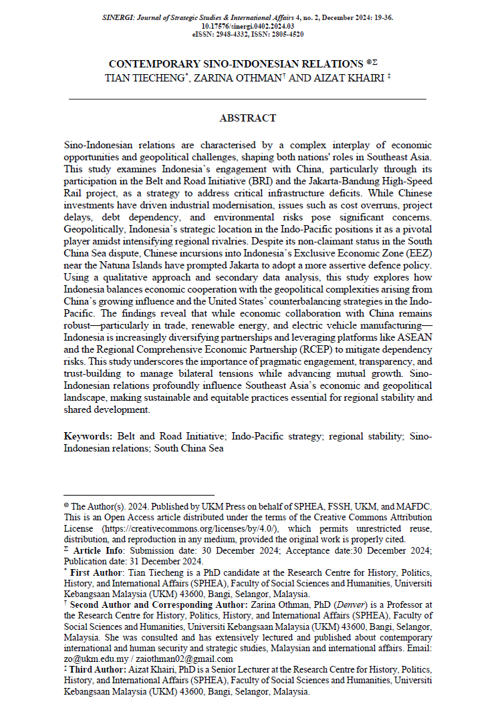Contemporary Sino-Indonesian Relations
Main Article Content
Abstract
Sino-Indonesian relations are characterised by a complex interplay of economic opportunities and geopolitical challenges, shaping both nations' roles in Southeast Asia. This study examines Indonesia’s engagement with China, particularly through its participation in the Belt and Road Initiative (BRI) and the Jakarta-Bandung High-Speed Rail project, as a strategy to address critical infrastructure deficits. While Chinese investments have driven industrial modernisation, issues such as cost overruns, project delays, debt dependency, and environmental risks pose significant concerns. Geopolitically, Indonesia’s strategic location in the Indo-Pacific positions it as a pivotal player amidst intensifying regional rivalries. Despite its non-claimant status in the South China Sea dispute, Chinese incursions into Indonesia’s Exclusive Economic Zone (EEZ) near the Natuna Islands have prompted Jakarta to adopt a more assertive defence policy. Using a qualitative approach and secondary data analysis, this study explores how Indonesia balances economic cooperation with the geopolitical complexities arising from China’s growing influence and the United States’ counterbalancing strategies in the Indo-Pacific. The findings reveal that while economic collaboration with China remains robust—particularly in trade, renewable energy, and electric vehicle manufacturing—Indonesia is increasingly diversifying partnerships and leveraging platforms like ASEAN and the Regional Comprehensive Economic Partnership (RCEP) to mitigate dependency risks. This study underscores the importance of pragmatic engagement, transparency, and trust-building to manage bilateral tensions while advancing mutual growth. Sino-Indonesian relations profoundly influence Southeast Asia’s economic and geopolitical landscape, making sustainable and equitable practices essential for regional stability and shared development.
Keywords: Belt and Road Initiative; Indo-Pacific strategy; regional stability; Sino-Indonesian relations; South China Sea
Downloads
Article Details

This work is licensed under a Creative Commons Attribution-NonCommercial-NoDerivatives 4.0 International License.
To learn more about our Open Acess and Copyright Policy, click here
References
Ahmad, A. A., Salleh, M. A. B., and Ladiqi, S. 2021. "China-ASEAN Disputes on the South China Sea and the Implication of US Involvement." NEW ARCH-INTERNATIONAL JOURNAL OF CONTEMPORARY ARCHITECTURE 8(2): 235–247.
Bing, C. H. I., and Gao, X. 2024. "Cross-Cultural Adaptation and the Performance of Sino-Indonesian Joint Ventures: An Empirical Study." Journal of Intercultural Communication 24(4): 38–55.
Febrica, S., and Romaniuk, S. N. 2021. "A Wary Warrior: Indonesia’s ‘Soft-Assertiveness’ in the South China Sea." In Security, Strategy, and Military Dynamics in the South China Sea, 151–78. Bristol: Bristol University Press.
Isabella, B. 2024. "Navigating and Exhibiting Ambivalence: Yin Hua Artist Organization and Sino-Indonesian Relations in the 1950s to 1960s." Indonesia 117(1): 31–57.
Muas, R. 2023. "Diaspora in Indonesia-China Relationship at the Comprehensive Strategic Partnership Era." International Review of Humanities Studies 8(1): 24.
Perwita, A. A. B., and Hanggarini, P. 2024. "Indonesia’s Engagement with China and India: Pragmatic or Ideational?" In India and China in Southeast Asia, 263–80. Singapore: Springer Nature Singapore.
Raditio, K. H., and Yeremia, A. E. 2022. "The Limits of Populism: SBY and Jokowi’s Strategies on the South China Sea Issue." In Populism, Nationalism and South China Sea Dispute: Chinese and Southeast Asian Perspectives, 79–109. Singapore: Springer Singapore.
Stenberg, J. 2024. "PRC Soft Power and Chinese Indonesian Arts." In Rising China’s Soft Power in Southeast Asia: Impact on Education and Popular Culture, 252.
Tritto, A. 2022. "How Indonesia Used Chinese Industrial Investments to Turn Nickel into the New Gold." Carnegie Endowment for International Peace.
Vickers, A. 2023. "Erasing and Re-inscribing Chinese into Indonesian History." Asian Ethnicity 24(1): 78–92.
WIDIATMO, D., SOETJIPTO, A. W., and YUDONO, R. M. 2024. "The Chinese Diaspora and Its Identity in Southeast Asia: Research Notes from the Perspective of International Politics." Issues & Studies 60(1): 2450001.
Wu, B. 2021. "Cold War, Chinese Overseas and Sino-Indonesian Relations: A Review." In 2021 International Conference on Public Relations and Social Sciences (ICPRSS 2021), 159–63. Atlantis Press.
Yan, K. 2021. "The Railroad Economic Belt: Grand Strategy, Economic Statecraft, and a New Type of International Relations." The British Journal of Politics and International Relations 23(2): 262–79.
Yan, K. 2023. "Navigating between China and Japan: Indonesia and Economic Hedging." The Pacific Review 36(4): 755–83.
Yani, Y., Machmudi, Y., and Rofii, M. S. R. 2023. "China-Indonesia Maritime Cooperation from the Perspective of Constructivism." Jurnal Keamanan Nasional 9(2): 373–98.
Yotes, T. 2024. "Chinese Indonesians and the New Chinese Migrants in Indonesia." In Research Handbook on Communication and Prejudice, 436–48. Edward Elgar Publishing.
Yuliantoro, N. R. 2022. "The Politics of Vaccine Diplomacy and Sino-Indonesian Relations." Global Strategis 16(1).
Zhou, T. 2022. "510 Not Found: The Reterritorialization of Sino‐Southeast Asian Relations in the Chinese Hinterland." Singapore Journal of Tropical Geography 43(3): 325–46.
Zou, Y. 2023. "China and Indonesia's Responses to Maritime Disputes in the South China Sea: Forming a Tacit Understanding on Security." Marine Policy 149: 105502.
Цзылин, Л. 2023. "Analysis of China-Indonesia Economic and Trade Cooperation." Россия в глобальном мире 26(1): 20–30.

